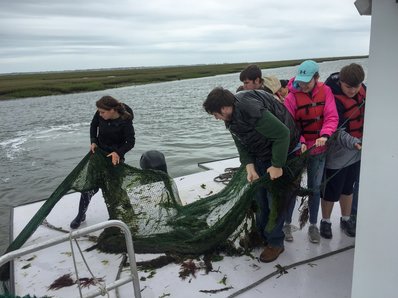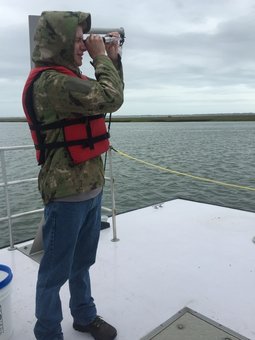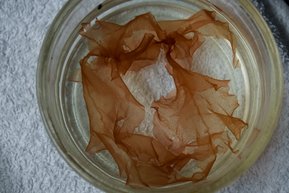 The CBFS campus is bustling with students right now from across the East Coast; from Montour County, Pennsylvania to West Peabody, Massachusetts, these groups come to learn about the unique barrier island and coastal ecology. This week, students from Danville High School, boarded our research vessels to compare the water quality from different depths of the bay. They collected samples of surface water and water from meters below and examined aspects such as temperature, salinity and pH levels. The students also studied the current speed and direction by seeing how long it took to carry out an 18 meter rope. While it may seem like a odd thing to measure, currents play a critical role in what nutrients are present in the water column, the movement of phytoplankton and plant life, migration patterns, and where marine debris travels. “I didn’t realize all the tests and experiments I can do in one little area,” Danville sophomore student Coleman said. He added that going out and experiencing the bay can give students a new perspective on what environmental science truly consists of and has the ability to inspire people. Once the students collected samples of aquatic life such as mummichogs, silver perch, long-clawed hermit crabs, mud dog whelks, clam worms, and microscopic plankton, they headed back to the lab to classify their findings under their taxonomy names and observe them under a microscope. “I never saw something move under a microscope, everything I’ve ever seen was still. I was shocked,” freshman student Emily said from Covenant Christian Academy (CCA) in Massachusetts, after examining phytoplankton.  Matt, CCA freshman, also enjoyed seeing moving organisms under a microscope and identified a copepod. Many students learn to identify copepods because the character Plankton from SpongeBob SquarePants is modeled after this microscopic creature. CCA freshman Caio said he enjoyed learning about the different classification categories for plankton. “There’s three different ways [to classify them]: their role in the environment, size, and life cycle,” Caio said. Plankton have two different roles in the environment. Phytoplankton are autotrophic producers and they make up the base of the food web in marine ecosystems, while zooplankton are heterotrophic consumers. Copepods are considered heterotrophic consumers. Planktons’ size also serves as part of their identity. Mircoplankton require a microscope to be seen and macroplankton can be seen with the naked eye. The final classification of plankton is the timeframe in which they are considered plankton. Holoplankton organisms forever remain planktonic while meroplankton organisms are considered planktonic for at least one stage of its lifecycle, not permanently, such as the blue crab. “I think this type of trip helps instill and reinforce a lot of science and helps students see science isn’t just restricted to the classroom,” CCA biology teacher Nalani Cushing said. She added that she hopes the CCA freshmen visiting CBFS on their academic travel week, which seeks to provide student with active, hands-on education, leave with a sense of curiosity about the world around them and see science in a new light.
0 Comments
Leave a Reply. |
About
Everything you need to know about CBFS's educational programs, visiting Chincoteague Island, and more! Categories
All
Archives
January 2019
|
CHINCOTEAGUE BAY FIELD STATION | 34001 Mill Dam Road | Wallops Island, VA 23337 | (757) 824-5636 | [email protected]

 RSS Feed
RSS Feed

